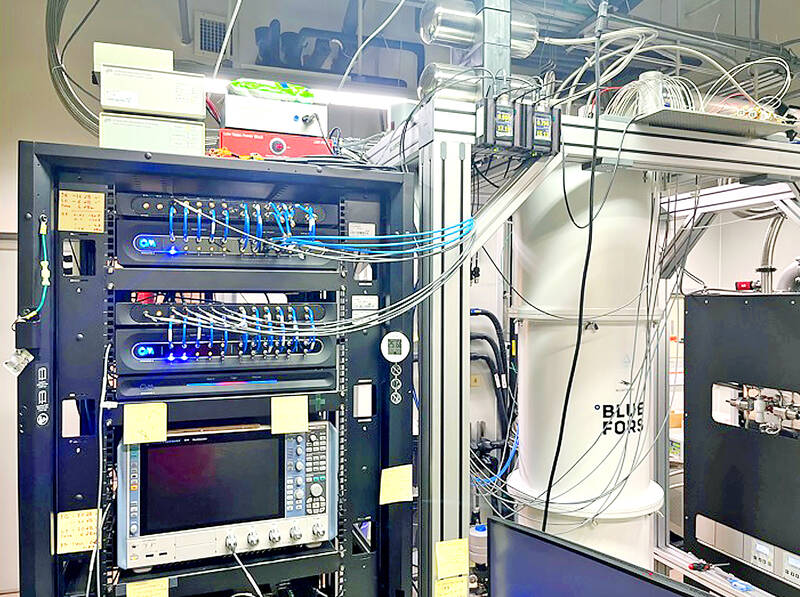Taiwan aims to produce its first domestically developed quantum computer by 2027, the National Science and Technology Council (NSTC) said yesterday.
Quantum computing is the most anticipated next-stage development for raw computational power, said Luo Meng-fan (羅夢凡), head of the NSTC’s Department of Natural Sciences and Sustainable Development.
The council has been working with the Ministry of Economic Affairs, Academia Sinica and other research organizations to realize a five-year, NT$8 billion (US$258.86 million) quantum technology plan that began in 2022, it said.

Photo courtesy of Chen Chi-tung, Institute of Physics, Academia Sinica
A Google study published in July last year showed how a random circuit sampling task that would have taken a classical supercomputer 47 years to complete was finished in just 6.18 seconds on the latest version of its Sycamore processor, which had been boosted to 70 quantum bit (qubits), Luo said.
In quantum computing, a random circuit sample task tests quantum computer performance by running random circuits and evaluating its capabilities and efficiency in solving complex problems.
With such powerful computational capabilities, security experts have warned that one day — dubbed “Q Day” — quantum computers would be able to crack codes protecting digital data, Luo said.
Measures to counter such development include quantum cryptography, such as quantum key distribution, he said.
However, quantum computers are still affected by high error rates, he said, adding that the technology needs another six years of research and development to reach maturity, when it could make a global impact.
That is why it is crucial for Taiwan to develop quantum computers to retain a foothold in critical technologies, he said.
The NSTC’s collaboration with academia and other sectors would flesh out the component supply chain for building quantum computers and shorten the time necessary when transitioning the supply chain for commercial purposes, Luo said.
Taiwan is not alone in rushing to develop quantum computers, he said.
Taiwanese researchers are in talks with Finnish quantum computing hardware company IQM to establish testing platforms in Taiwan, he said.
Four cloud software computational platforms are utilizing the quantum cloud computation services offered by IBM, Amazon and other international companies, he added.
Academia Sinica is to provide some of its newly developed 5-qubit chips for trials at research facilities later this month, said Lee Chau-hwang (李超煌), executive secretary of the institute’s Central Academic Advisory Committee.
Taiwan has only started developing quantum chipsets, but is closely monitoring increasing chipset yield rates, Lee said.
“Yield rates are key for mass production,” he said.

Taiwan is to commence mass production of the Tien Kung (天弓, “Sky Bow”) III, IV and V missiles by the second quarter of this year if the legislature approves the government’s NT$1.25 trillion (US$39.78 billion) special defense budget, an official said yesterday. Commenting on condition of anonymity, a defense official with knowledge of the matter said that the advanced systems are expected to provide crucial capabilities against ballistic and cruise missiles for the proposed “T-Dome,” an advanced, multi-layered air defense network. The Tien Kung III is an air defense missile with a maximum interception altitude of 35km. The Tien Kung IV and V

The disruption of 941 flights in and out of Taiwan due to China’s large-scale military exercises was no accident, but rather the result of a “quasi-blockade” used to simulate creating the air and sea routes needed for an amphibious landing, a military expert said. The disruptions occurred on Tuesday and lasted about 10 hours as China conducted live-fire drills in the Taiwan Strait. The Civil Aviation Administration (CAA) said the exercises affected 857 international flights and 84 domestic flights, affecting more than 100,000 travelers. Su Tzu-yun (蘇紫雲), a research fellow at the government-sponsored Institute for National Defense and Security Research, said the air

Taiwan lacks effective and cost-efficient armaments to intercept rockets, making the planned “T-Dome” interception system necessary, two experts said on Tuesday. The concerns were raised after China’s military fired two waves of rockets during live-fire drills around Taiwan on Tuesday, part of two-day exercises code-named “Justice Mission 2025.” The first wave involved 17 rockets launched at 9am from Pingtan in China’s Fujian Province, according to Lieutenant General Hsieh Jih-sheng (謝日升) of the Office of the Deputy Chief of the General Staff for Intelligence at the Ministry of National Defense. Those rockets landed 70 nautical miles (129.6km) northeast of Keelung without flying over Taiwan,

A strong continental cold air mass is to bring pollutants to Taiwan from tomorrow, the Ministry of Environment said today, as it issued an “orange” air quality alert for most of the country. All of Taiwan except for Hualien and Taitung counties is to be under an “orange” air quality alert tomorrow, indicating air quality that is unhealthy for sensitive groups. In China, areas from Shandong to Shanghai have been enveloped in haze since Saturday, the ministry said in a news release. Yesterday, hourly concentrations of PM2.5 in these areas ranged from 65 to 160 micrograms per cubic meter (mg/m³), and pollutants were